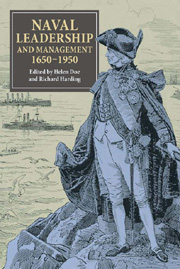Book contents
- Frontmatter
- Contents
- List of Tables
- List of Editors and Contributors
- Acknowledgements
- List of Abbreviations
- Michael Duffy: An Appreciation
- Introduction
- Leadership: The Place of the Hero
- Leadership and Organisational Frictions: Contested Territories
- 3 Who has Command? The Royal Artillerymen aboard Royal Navy Warships in the French Revolutionary and Napoleonic Wars
- 4 ‘The Marine Officer is a Raw Lad and therefore Troublesome’: Royal Naval Officers and the Officers of the Marines, 1755–1797
- Management Capability and the Exercise of Naval Power
- The Evolution of Management Training in the Royal Navy, 1800–1950
- Select Bibliography
- Index
4 - ‘The Marine Officer is a Raw Lad and therefore Troublesome’: Royal Naval Officers and the Officers of the Marines, 1755–1797
from Leadership and Organisational Frictions: Contested Territories
Published online by Cambridge University Press: 05 February 2013
- Frontmatter
- Contents
- List of Tables
- List of Editors and Contributors
- Acknowledgements
- List of Abbreviations
- Michael Duffy: An Appreciation
- Introduction
- Leadership: The Place of the Hero
- Leadership and Organisational Frictions: Contested Territories
- 3 Who has Command? The Royal Artillerymen aboard Royal Navy Warships in the French Revolutionary and Napoleonic Wars
- 4 ‘The Marine Officer is a Raw Lad and therefore Troublesome’: Royal Naval Officers and the Officers of the Marines, 1755–1797
- Management Capability and the Exercise of Naval Power
- The Evolution of Management Training in the Royal Navy, 1800–1950
- Select Bibliography
- Index
Summary
The command hierarchy of a ship-of-the-line in the eighteenth century has been widely written about within recent naval historiography. However, one area that has been largely overlooked is the conflict, in relation to their place in the ship's hierarchy, between the British Marine Corps officers and their Royal Navy counterparts and their eventual acceptance. The conflict reinforces the perception of the growing authority and centralization of command by the Admiralty. From the very start of the new marine divisions in 1755, the Admiralty constructed the new command structure in such a way as to integrate the marines, yet divide them from the navy. This new command structure would create friction between the marines and navy, especially among the officer ranks. One area of contention that existed between marine and naval officers was with regard to the marine officers' social backgrounds. These social conflicts existed as a result of the majority of marine officers coming from a substantially lower class than their naval counterparts. This created hostility within the ship's wardroom, even though the marine officers had the right to sit in the wardroom because of their commissions. To cure this problem, the marine officers developed three methods by which to integrate themselves into the command hierarchy via their amphibious operational roles. The first stage of this development was to use external influences, such as army commanders, to exert influence on their naval commanders to help marines in amphibious and command matters.
- Type
- Chapter
- Information
- Naval Leadership and Management, 1650–1950 , pp. 77 - 92Publisher: Boydell & BrewerPrint publication year: 2012



